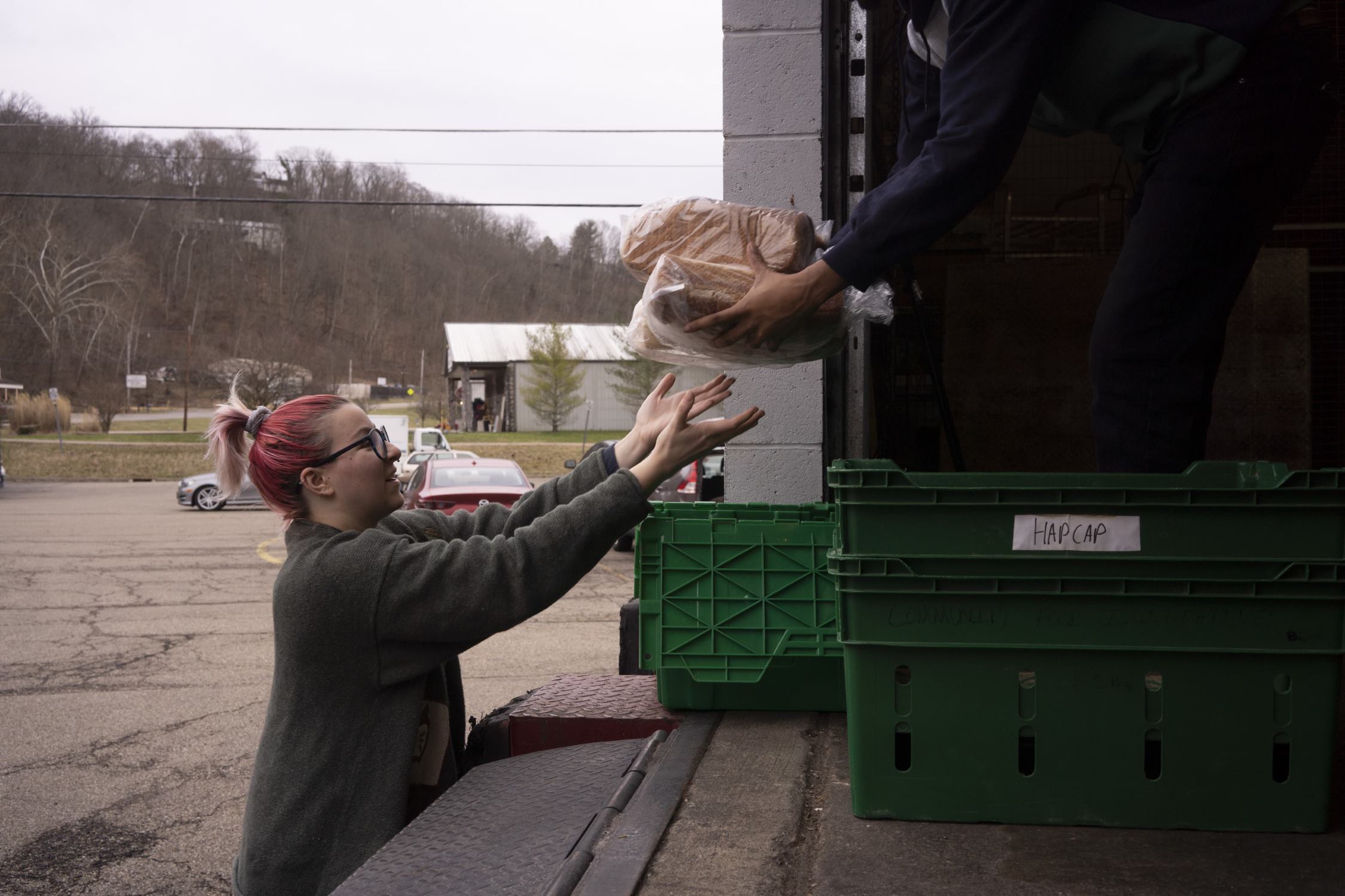By Anna Birk, Photo by Joe Timmerman
The Appalachian Accessible Food Network in Southeast Ohio unites to provide fresh produce to local communities.
By Anna Birk, Photo by Joe Timmerman
Anyone who stumbles upon the Athens Community Center on a Saturday morning will be greeted by a bustling vendor-filled parking lot teeming with chatter, artisans and the smell of fresh produce wafting through the tents.
Though the Athens Farmer’s Market may be a hub for farmers, it is not always feasible for community members to access the market, let alone to eat healthy, local foods.
One out of six people struggle with hunger in the Southeast Ohio region, according to Hocking-Athens-Perry Community Action (HAPCAP). For children, that margin rises to every one out of four.
“The food that is near us is crap,” Tiffany Arnold, assistant professor of instruction in the College of Health Sciences and Professions at Ohio University, says. “It’s processed food. It’s high in fat, sodium and sugar. We just don’t have actual, physical access to [healthy food] … We can’t get to it.”
Lower-income communities tend to lack stores that sell healthy affordable foods. In rural areas, the issue is compounded due to the lack of physical access to those stores, with people often needing to drive further to buy food. This is what is known as a food desert.
To increase the access to fresh and local produce, several non-profit organizations have joined forces to help residents in southeastern Ohio.
The Appalachian Accessible Food Network (AAFN) is a collaborative partnership between Rural Action, Community Food Initiatives (CFI) and the Appalachian Center for Economic Networks (ACEnet).
“Something that we all really excel at is supplementing each network partners’ work in some way so that we can collectively work towards long term regional resilience and equitable access to healthy food here,” Susie Huser, director of outreach at CFI, says.
Each of these partners contribute its own area of expertise and offer different resources to the community.
Each program within the AAFN’s umbrella is incredibly beneficial; Rural Action’s Chesterhill Produce Auction, CFI’s Veggie Van and the ACEnet’s Food Ventures Center are some of its most well-known.
Rural Action’s Chesterhill Produce Auction
During peak summer months, the Chesterhill Produce Auction is an array of color as producers stock the space with fresh fruits, veggies, meats and other homemade products.
The people in attendance seem to rival the amount of produce as it is one of Rural Action’s most successful social enterprises. Originally run out of a tent, the auction has now found a permanent space on Wagoner Road in Chesterhill.
Founded by Jean and Marvin Konkle in 2004, the auction got its start before being purchased by Rural Action in 2010.
“The Chesterhill Produce Auction … is a place where producers can bulk, or not bulk, sell their food,” Tessa Wieneke, food access partner’s coordinator for ACEnet, says.
This year, the auction will begin regular operation Mondays and Thursdays in May.
“It ebbs and flows with the season, so the markets at the very beginning and very end of the year are much lighter,” Wieneke says. “But in August, the auction floor is just full. Sometimes the auction is an hour and sometimes it’s four and a half.”
The auction works as a connection between local farmers and buyers. Farmers from Southeast Ohio bring their produce, livestock, woodworkings and other wares to the auction. On the auction floor, buyers include restaurants, schools, universities and other AAFN services.
By hosting the auction, Rural Action helps stimulate the local economy, allowing produce and money to flow right back into the arms of residents.
Community Food Initiatives Veggie Van
Those who live in Southeast Ohio may have seen a bright white van driving through their neighborhoods, stopping in parks, libraries or markets to set up a mobile produce stand. The veggies pasted on the side of the van invite people to come and pay what they are able in exchange for local produce. This is the CFI’s Veggie Van.
The Veggie Van is a mobile farmstand that travels throughout southeastern Ohio, bringing local produce to towns that may not always have the best access to groceries. Manager Ivan Orquera says the Veggie Van initially began as part of a health study through the University of Buffalo. The study lasted only two years, ending with the season’s close in 2022.
While no longer part of the study, Orquera explains they have extended their partnership into 2023.
Thanks to the Veggie Van, transportation obstacles that may have left residents in food deserts are eliminated.
“Last year … the library system did a presentation that some of our CFI people participated in,” Orquera says. “The towns that utilized the most social services were Nelsonville, Coolville and Glouster, which happen to be the towns that we serve.”
Last year, Orquera took the Veggie Van to both Coolville and Glouster once a week with pop-ups in Nelsonville, Albany, Athens and Marietta.
“It might be as simple as, we go directly to them,” Orquera says. “It’s obvious that those towns in particular could utilize services like ours, and ours focuses particularly on food access.”
The Appalachian Center for Economic Networks’ Food Ventures Center
This space may look like just another warehouse from the outside. Walking into ACEnet’s Food Venture Center, however, you will quickly be greeted with busy kitchens and the aroma of fresh food.
Local kitchens such as Crumb’s Bakery and Casa Nueva operate alongside one another. Layered chatter floods the shared 14-oven kitchen space and assembly stations.
The Food Ventures Center is not only available to existing local businesses but to those who produce food within their home looking to scale up, otherwise referred to as Cottage Food Production Operations by the Ohio Department of Agriculture.
“We provide business development assistance. We provide that infrastructure, that space for folks to grow into,” Adam Kody, food enterprise coordinator at ACEnet, says.
The beauty of the Food Ventures Center is that it offers a safe space for the ‘privilege of failing,’ a phrase that Kody first heard from the executive director of a kitchen in Boston.
“The ‘privilege of failing’ … is to offer a space where someone can come in to live out their dream,” Kody says. “Our space allows people to take that step … and if it doesn’t work out, their life isn’t ruined.”
The AAFN
The web of services the AAFN offers has proven successful in the Southeast Ohio region.
The Veggie Van distributed over 11,000 pounds of produce to over 1,300 people, according to CFI’s 2022 annual report. In 2021, ACEnet celebrated its 25-year anniversary of the Food Ventures Center, and as of 2021, the center assisted over 400 food and farm entrepreneurs.
Although these organizations are incredibly beneficial to the community, there are still challenges.
“In the winter, there’s just not any produce to be had,” Arnold says. “We’re dealing with seasonal produce … in the winter, what do you do?”
During these months, the AAFN and other community organizations contribute what they can.
“Typically, we end up handing out more donated bread and eggs and sauces—pantry staples—than actual produce,” Wieneke says. “We end up getting a lot of donated bread from Crumb’s Bakery and from Jackie O’s. That ends up being most of the food we give away.”
The Chesterhill Produce Auction, Veggie Van and Food Ventures Center are only part of what the AAFN offers. Other services through AAFN partners include the Donation Station, Community Gardens and Farm to School services, all of which have flourished in the region.
While food insecurity in southeastern Ohio is ever-present, these organizations have made strides to give access to healthy, fresh foods that nourish and support local farmers and residents.
“Everyone deserves it. It’s a basic human right—to have access to nourishing and delicious food,” Huser says.
SEO
Related posts
What’s Inside
- Behind the Bite (68)
- Features (124)
- In Your Neighborhood (102)
- Photo Essay (4)
- Read the Full Issue (8)
- Talking Points (48)
- The Scene (15)
- Uncategorized (3)
- Web Exclusive (5)
- What's Your Story? (21)


Find us on Social Media